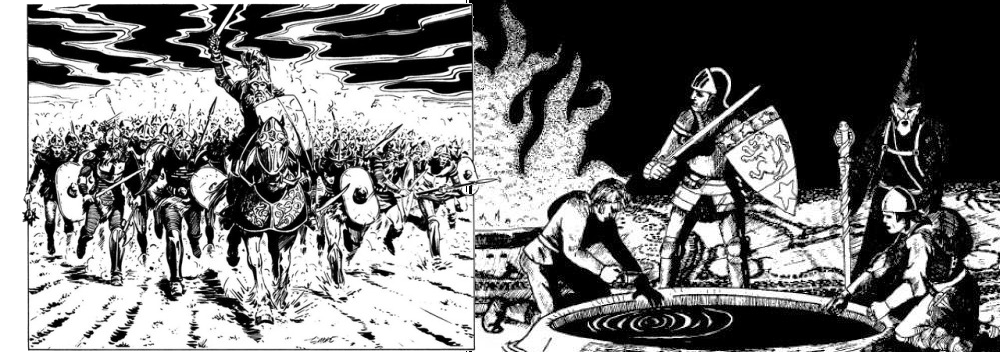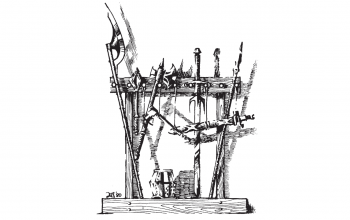
A bit of OSR kool-aid I drank long ago and I now regurgitate regularly is the notion that old school D&D is more heavily focused on exploration, while recent editions of the game focus more on combat. I think I probably first picked this up from Grognardia, where James posted this wonderful little excerpt from the OSRIC rulebook:
OSRIC is a game of adventure, and the primary activity in adventures is exploration. Even though the rules for combat take up more space in this rulebook, play tends to focus more on exploration than combat. Whether the party is investigating an old ruined shrine, delving into an abandoned dwarfish mine, traversing an unknown wilderness, sailing uncharted waters, or venturing beyond the physical world into the planes of existence, exploration is central to adventure and thus to the game.
I think this struck a nerve for a lot of folks, myself included. It also explains a lot in the game for me – things like XP being more heavily based on treasure than killing monsters, and codified morale rules. This topic came up around the game table recently, and the group I’m playing with has been playing together literally for decades, so they’re well rooted in both old and new school. One interesting argument put forth by one of the players was that the primordial origins of D&D was in fact war games, games specifically entirely about combat. Combat, he argued, was baked into D&D’s DNA from the first, and has thus always been the primary focus of the game.
It is true that D&D grew up out of wargaming, heck the original printing refers the player to the war game Chainmail to adjudicate combat. One could argue that delegating such a large part of the mechanics of the game to another publication is perhaps itself evidence that it couldn’t be the primary focus, but we also know that Gygax never even used these rules in his own games (5th post here). It would seem that the inclusion of war game elements spoke more to the audience D&D was targeting, similar to the use of the wordy subtitle of the first printing: “Rules for Fantastic Medieval Wargames Campaigns Playable with Paper and Pencil and Miniature Figures.”
There’s a very nice discussion of this topic on rpg.stackexchange.com here, with this summary in the most highly voted answer:
…the history of D&D is inextricably linked with the history of RPGs as a concept, such that, in many ways, D&D can be seen as a “living fossil” of what the whole genre of “role-playing games” originally started from. If D&D today seems combat-heavy, it’s only because we’re looking at it from a modern perspective, and comparing it to the many other game systems which took the ideas pioneered by D&D and ran with them much faster and further than D&D itself ever did.
I like this concept of D&D being so linked to the history of RPGs in general that it’s difficult to pull apart the threads. I suspect given the evolutionary nature of D&D, that saying “design decision X was of primary concern” would simply never fly. Even the creators, were they still around to discuss it, might have trouble saying exactly what decisions were made when and why.
As we saw from Mearls’ posts, D&D means a lot of different things to a lot of different people, and I think this has been true since 1974. Trying to pull a single thread out as being “primary” seems perhaps foolish, and any arguments in one direction or the other will always have unintended overtones of “you’re playing it wrong.” Perhaps it is better to say, “My games of D&D focus on exploration over combat, and I use the following rules to emphasize this.”
One interesting footnote, the above quoted post on rpg.stackexchange.com includes this one tantalizing comment from just a few months ago:
Rob Kuntz is about to publish a book that will render this answer (perhaps) obsolete. I have the “teaser” of four essays that he put out, and will comment further once I’ve read his book.
Is this true? Gosh I hope it is. Where can I get this book?



Short answer: I agree with you. Nice observation.
Long answer: Its interesting (and sometimes a bit depressing) all the people saying how ‘this’ or ‘that’ is the correct or best way to play a game (rpg). Any rpg game. I took to heart the advice from the early games that it was a) mine to do with as I pleased and b) hacking the rules was ok – both in support of the core goal – for you and your mates to have fun playing the game. My observation of how it was played in the 1980s in my neck of the woods when I first started was that it mostly an exploration focus. And respecting your comments – I’m not trying to tell anyone how to play their game, nor what is best. Fights were fun and part of that. A large part. But so was cleverly avoiding fights or finding traps. So was levelling up – but only as a measure of you getting better, of making progress. All driven by investigations and explorations of one kind. In the majority of the groups I was aware of and involved with. Games of Runequest and Traveller were often very much the same, but modified by the different settings. Cult allegiance and missions became our focus in RQ, and in Traveller all the groups I played with tended to perversely avoid trade – so we were pirates, mercenaries or scouts and scientists. Not mercantile at all. And while character life was cheap, people developed characters and personalities well beyond the stereotypical alignments and ‘dwarven fighter’ tropes. At least then they did.
It is true that RPGs cover a very broad spectrum of activities and what some find to be the core fun element may not be true for others. Debating which is “best” is both futile and pointless.
This is a topic I often find myself dancing around on this blog, chiefly because I recognize that fact and don’t want to discredit anyone’s preferences, but I do want to dissect my own experiences with some level of academic rigor. There is certainly an interesting historical point of “what did the original authors intend?” It’s a very academic question to ask, and ultimately shouldn’t have any impact on perception on the “right” way to play a game, but is interesting in its own right, and what I was trying to explore here.
More pragmatically, when considering anything from writing a convention listing to forming a new weekly gaming group, understanding up front what you’re signing up to play is key to ensuring everyone has a good time. Unfortunately the de facto short-hand of “do you want to play D&D” is perhaps insufficient to this task. I think based on the above I’d say that “do you want to play Original D&D” is also not quite enough – the historic information of the printing is certainly more specific, but perhaps still not enough to fully inform on style of play.
These days, I think I would prefer “do you want to play old school D&D?” I think this is the one thing the OSR has really done well – it has codified a style of play with the simple term “old school”. Whether or not it is correct in the assumption that this is how the game was intended to be played by the original authors, it does at least inform the audience of the desired play style (eg. see Matt Finch’s Old School Primer.)